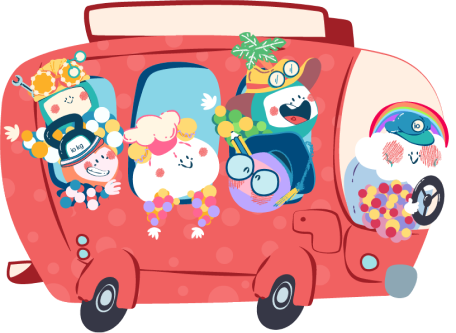Learning about science, math, and history is crucial for your kids. These subjects are taught in school to prepare them to deal with the world when they grow old. But they should learn something that can be applied across all these fields—critical thinking.
While it’s not often discussed in school, critical thinking is an essential skill that kids can use in their everyday life until they grow up. As parents or guardians, you should consider adding some necessary thinking activities to your bonding time. We’ve listed the best and easiest activities to get you started!
- What am I?
In this popular kids’ game, you will describe an object to your kid and let them guess what it is. This might be a food, a toy, an appliance – anything kid-friendly. Use its size, color, texture, or even smell if applicable.
You can take turns describing things and guessing them. Hopefully, by the end of the game, you can notice that your kid has used more adjectives in describing and has also gotten better at guessing the answers to the game!
- Predicting the ending
Courtesy of Josh Applegate
Look for a story your kid doesn’t know yet and read it to them. From time to time, pause for a while and then ask what they think will happen. You might tell the rest of the story if they got it correctly.
If your little one had a different scenario in mind, you could talk about how other things could have been if their prediction had happened. In this case, you can decide which is the better ending—the original or your child’s version!
- Like or Dislike
From your kid’s favorite movies, you can have a list of decisions and choices made by the characters, then decide if you like this or not. For example, did they like it when Mulan pretended to be a man? How about when Elsa went away and left Anna?
You can also share your preference and take turns answering. You’ll be surprised by how imaginative and critical your child can be!
- True or False
Have you been having difficulty getting your child to study for school? Turn your review sessions into a game! In True or False, you just have to say statements, and your kids will be the ones to say whether that is the truth.
If they would rather not talk about academics, you can also make this game about decision-making. For example, you can ask them if it’s true that eating too many candies can damage their teeth! The more relatable, the more engaged they will be!
- Categories
Groups of all ages can play the categories, including having your kids as players! The instructions are pretty simple. You give a kid-friendly category; then, the players must provide specific objects. Last kid standing wins!
Some categories you might consider when playing are characters of their favorite cartoon, Disney Princesses, or even the current contents of your refrigerator!
- I spy
Courtesy of Allan Mas
Much like the “What am I?” game, I spy also a game to test your kids’ basic senses. You have to observe around the place you are in and then describe whatever you’ve seen. Do this in a park, outside a restaurant, or even near the beach if possible!
Be more creative in guessing so they can learn more ways to describe simple things around them! I spy with my little eye… a game that will help you bond and develop your little one’s critical thinking skills!
- Build a story
Put your child’s wild imagination to the test by writing your own story with them. Start with the time and venue of the plot, then let them decide who the characters will be or what will be the story’s premise!
Your plot can be as bizarre as possible, but make sure everything stays kid-friendly! You get to decide how long the story will be. Set a time limit or a maximum number of turns for each participant!
- Tic-Tac-Toe
This simple yet effective thinking activity will help your little one strategize how to win. While the mechanics is as easy as forming a line using your three elements, it can still stir the players’ thoughts.
It’s important not to let just your kids win! Let them plan and strategize. In several rounds of play, you can take turns on who will play first!
- Chess
Courtesy of Mart Production
Another game that can surely instill critical thinking in your kid is chess. If they already know how to play, always practice with them to improve their techniques and decision-making. It might be intimidating for a while, but a friendly game is undoubtedly enjoyable to both players!
You can always teach them the basics if they’re just starting to develop an interest in the game. They can learn many strategies and moves, from protecting their king to attacking yours!
- Hidden Object
Do you prefer a physical activity that can also develop critical thinking in kids? Try hidden objects! It’s pretty easy to do. Just hide an object and let your kids search for it. Have varied difficulty levels, though! You want them to enjoy but also to be challenged.
This activity will help your kids strategize how to find the hidden object. Consider setting a time limit as well—this will make things more interesting!
Frequently Asked Questions on Critical Thinking Activities for Kids
What are some critical thinking activities?
There are many different critical thinking activities you can do with your kid, depending on their mood. Check out this list of fun activities to try! You can play board games like chess and tic tac toe. But if your little company wants to go out, you can highlight the things around them by playing “What am I?” or “I spy!”
How do you teach critical thinking to kids?
Teaching critical thinking to kids is all about raising the right questions and ensuring focus. This can be more entertaining when done through games! In this list, you will find simple activities you can do with your kids that will exercise their critical thinking skills. These can enrich their vocabulary, enhance their focus, and help them strategize.
What is a real-life example of critical thinking?
Critical thinking is not merely confined to strategic thinking given a specific situation. For kids, it’s also being able to discern what is the problem, analyze the circumstances, and decide how to act accordingly.
For example, dealing with a friend who gives no effort on homework and always just depends on your child for the answers will require critical thinking. They are your little one’s friends, but their actions are also wrong. This situation involves analysis of the situation and careful decision-making.
How can we apply critical thinking in our daily life?
You might not notice it, but your kids often use critical thinking when they avoid that extra scoop of ice cream or when they decide to share their food with their playmates. Even when they feed the stray cat on the way home, they use critical thinking to solve ordinary problems and find the best ways to do so.







